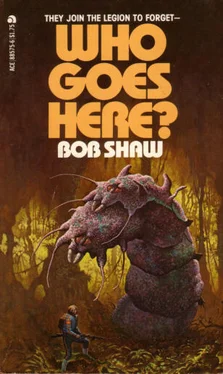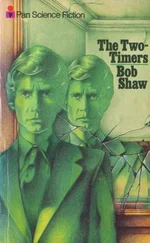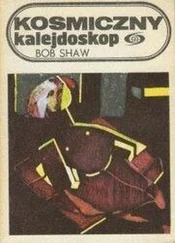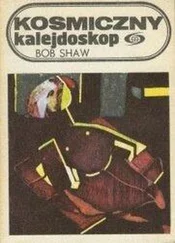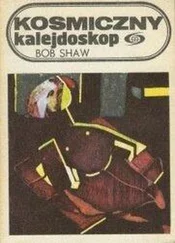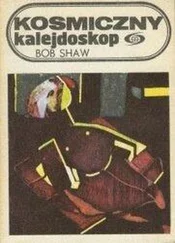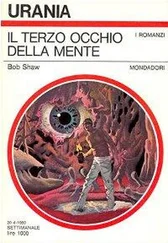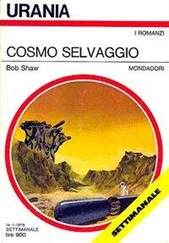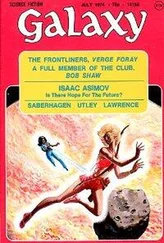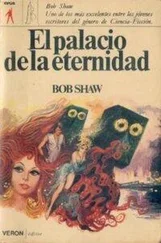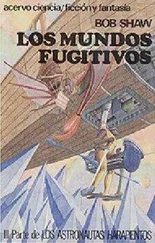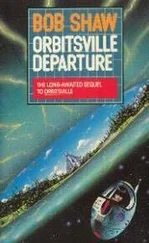The practical side of Peace’s nature suddenly made him aware that he was wasting his time in futile speculation, and that his primary requirements were clothing, money and an accurate fix on his position in time. He opened several closet doors and was scarcely able to believe his luck when he found, hanging on a rusted nail, a once-white coat of the type favored by laboratory workers. It was much too short, but a full search of the room’s storage spaces yielded no further treasures. He moved upstairs and while touring the empty living rooms discovered a pair of fluffy bedroom slippers which, judging by their size, could once have belonged to Legge’s daughter. They were on the verge of disintegrating with extreme age, but fitted him quite well and gave his feet some measure of protection. The complete ensemble was, Peace felt, somewhat lacking elegance, but it was possible that if the building had not acquired the reputation of being haunted the local urchins would have stripped it bare, and he would have been left in a similar condition.
Reminded of the method by which small boys traditionally supplemented their incomes, Peace thought of the miscellaneous scraps of hardware languishing in the dust of the laboratory. One of the items had been a bunsen burner which, for all he knew, might have acquired the status of a semi-antique since it was last in use. He rushed back to the big laboratory, spread out his newspaper and collected on it a heap of copper coils and small pieces of electronic junk. The bunsen burner had a solid, well-crafted feel to it and, although it was not in the same class as a nineteenth-century brass microscope, Peace could imagine a trendy collector getting quite excited over it.
He wrapped his plunder up in a bundle and went out of the laboratory and down the stairs to street level. After a brief struggle with a rusty shootbolt, he opened the door and stepped out into a cool purple twilight. The alley was deserted, but the sound of traffic told him the business life of the city was still in full spate, which meant the season was either spring or autumn, and that the time was late in the afternoon. He turned to the right, away from the street where he had seen the Oscars, and headed for the opposite side of the block.
On reaching the corner he peered out cautiously and was relieved to note that the passing vehicles looked very much as he remembered them—an indication that he had not jumped to a distant era of the future. The lighted store windows looked reassuringly normal, as did the pedestrians who hurried by Peace without sparing him a glance. Emboldened, he joined the flow of people and began searching for a likely antique shop. His progress was impeded by the shuffling gait he had to adopt to make the fluffy mules stay on his feet, and to his horror a playful breeze kept lifting the hem of his lightweight coat, forcing him to stop every now and again to tuck the garment between his legs.
Doubled over, clutching his parcel, unable to raise his feet or separate his knees, Peace was uncomfortably aware that he looked like a skulking transvestite Quasimodo—a sight which, even among the most blase city-dwellers, was bound to excite comment.
As he had feared, men and women began to stop to watch him pass by. He tried grinning at them to create the impression he was a harmless idiot, but within a short time he was being followed by a knot of interested spectators. The nightmarish feeling intensified as he realized the police were bound to become involved sooner or later. He was preparing to stand up straight and make a run for it, regardless of the amount of exposure involved, when he noticed a sign a few doors further along which said: R. J. PENNYCOOK-Antique Dealer. Filled with relief, he scuttled towards the discreet-looking establishment, darted inside and slammed the door behind him. He leaned against it, breathing heavily, feeling like a fox which had just been delivered from a pack of hounds.
“If you don’t get out of here immediately,” said a cold-eyed young man, from behind a glass counter, “I’ll send for the police.”
“You can’t do that to me,” Peace gasped, shaking his head.
“I’d like to know why not.” The young man picked up a subetheric whistle and raised it to his lips.
Peace glanced around him and his heart sank as he saw he had taken refuge in a shop which catered for the extreme top end of the market, the sort of place where Ming vases are thrown in free with the really expensive purchases. Suddenly his corroded bunsen burner seemed to have lost its cachet, but he could think of no other course than to brazen the matter out and play for time.
“For the simple reason, Mr. Pennycook,” he said impressively, advancing to the counter, “that I’ve got something to sell, something whose value you may not appreciate at first glance, but the like of which may come your way only once in a lifetime.” He set his parcel on the counter and spread it open, revealing what—even to his eyes—looked like a shovelful of scrap metal. Even the bunsen burner, pride of the collection, had separated into its constituent parts.
Pennycook looked down at the miscellany. The faint trace of colour that had been in his cheeks promptly disappeared, and within the space of a second his expression changed from one of disdain—through incredulity, joy and greed—to a look of respectful wariness. “Is this yours to sell?”
“Of course.”
“Where did you get it?”
“Just picked it up.” Peace, who had been watching the play of emotion on the dealer’s face, began to wonder if he had stumbled on to a craze for old bunsen burners which would guarantee him enough money for a second-hand suit. “There could be more where that came from,” he added encouragingly, tapping the side of his nose.
“I’ll give you a thousand for it,” Pennycook said briskly. “No questions asked.”
“A thousand!” Peace began scanning the small mound of salvage, trying to see each grubby piece with the sort of unbiased eye which could identify hidden riches.
“All right, two thousand—but that’s my top offer. Is it a deal?”
Peace swallowed with some difficulty. “It’s a deal.”
The young man took two large and colourful banknotes from a drawer and handed them to Peace. He then carefully gathered up the bunsen burner and other items and dropped them into a waste disposer. There was a flash of greenish atomic fire as the objects ceased to exist.
“What are you doing?” Peace said, shocked at the casual destruction of what he had begun to see as an art treasure.
“We don’t need them any more,” Pennycook said. “It was a good idea to wrap the paper round some old junk—the old stealing of wheelbarrows trick, the old purloined letter ploy—but you could have got it dirty.” He smoothed the newspaper out with reverent hands, examined it closely and looked up at Peace with a shocked expression. “If I didn’t know better, I’d almost think somebody had been eating a porkpie off this.”
“Never!” Peace said numbly.
“I suppose you’re right. Nobody in his right mind would desecrate a mint, laser-imprimed, Waldo-folded 2292 newspaper.” Pennycook gave Peace a conspiratorial glance. “It’s a long time since I’ve seen a specimen as good as this—it’s almost as if you’d got hold of an extroverter and gone back for it.”
“But that sort of thing is illegal,” Peace said, winking in an effort to pass himself off as a useful source of contraband. The mentality of the dedicated collector was foreign to him, but—now that he finally understood the situation—he was determined to take every advantage it offered. “Listen, Mr. Pennycook, do you…”
“Call me Reggie, please.”
“Okay, Reggie—I’m Warren—do you think we could go into your office and talk? I feel a bit awkward standing around with practically no clothes on.” Acutely conscious of the thinness of his legs, Peace endured a head-to-foot perusal of his body.
Читать дальше
